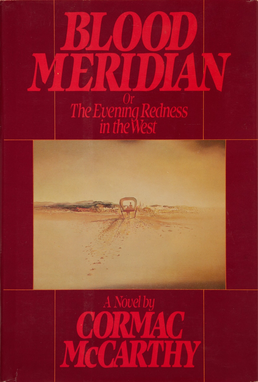Part 8
byPart 8 of Blood Meridian begins with a vivid portrayal of the setting as Toadvine and the Kid enter a shadowy cantina. The cantina’s dimly lit atmosphere is thick with tension, and the two men pool their coins to purchase drinks. They approach the bar, where they encounter a frail bartender who looks at them with suspicion. Toadvine asks for strong drinks with minimal risk, a request that seems to confuse the bartender before he eventually serves them mezcal in tin cups. The drink, with its sour taste, acts as a foreboding symbol of the grim journey ahead, setting the stage for the bleak experiences that will unfold throughout the narrative.
As the two men sip their drinks, the atmosphere grows even more ominous with the appearance of an old man who approaches them. He recognizes them as Texans and begins to reminisce about his past. The loss of his finger, possibly symbolizing a violent history, seems to mark him as a man weathered by hardship. The old man’s tales shift toward the conflict with the Apache, his questions about their earnings hinting at the brutality that defines their world. He speaks of the bloodshed that has stained the land and Mexico’s own violent history. His weary prayers for the country convey the toll that these conflicts have taken, not just on the land, but on the men who have lived through them.
Once the old man exits the cantina, Toadvine and Bathcat resume their observations, noting the tense atmosphere that still lingers. They mention a boy in the corner who had been cut by another man at a card table, adding to the dark undertones of the cantina. The two men’s journey takes them further into desolate streets before they arrive at a camp beyond the city. The sounds of dawn emerge, and the men witness the aftermath of violence from the previous night in an Indian camp. The remains of the conflict serve as a grim reminder of the constant bloodshed and despair in this harsh world, as the landscape itself becomes filled with the echoes of past violence.
As they continue their ride, the group notices that Chambers, a member of their company, is missing. When the judge inquires about his whereabouts, Toadvine responds indifferently, suggesting that Chambers simply quit the group. This casual dismissal of Chambers’ absence further emphasizes the uncertainty and transience that defines the lives of these men. The group rides deeper into the mountains, heading toward a mesa that overlooks an expansive desert. The desert, with its silent witness to countless battles and struggles, provides a stark backdrop to the journey ahead, while also symbolizing the violence that pervades this unforgiving land. Tensions within the group mount as Jackson, one of the white men in the group, behaves aggressively and drunkenly, his actions sowing further discord among them.
The chapter reaches its violent climax when Jackson, in a fit of rage, is killed by a black man in a brutal confrontation. The violence is sudden and shocking, leaving the group in stunned silence. The death serves as a grim reminder of the harsh reality they live in, where life is cheap and death is always just one step away. The chapter concludes with the group moving on the following day, now down one member, as they continue their journey through the brutal and unforgiving landscape. The absence of Jackson and the lingering tension within the group foreshadow the further violence and conflict that await them. The chapter’s dark tone continues to emphasize the brutal and relentless nature of their existence, with violence and mortality ever-present in their world.

